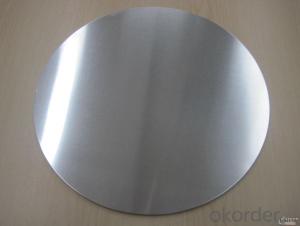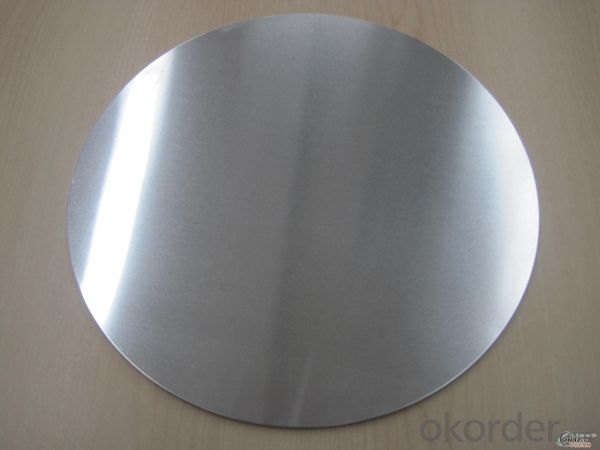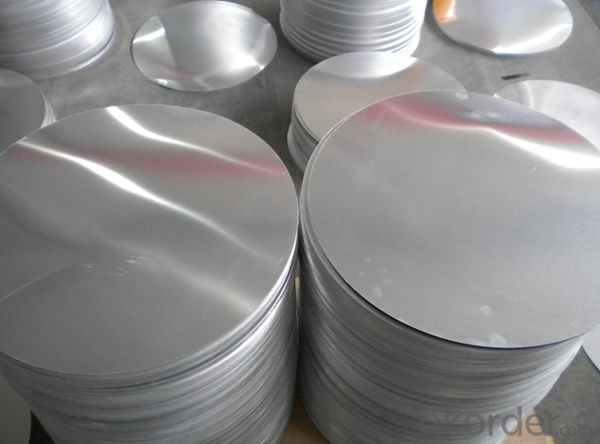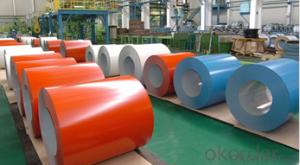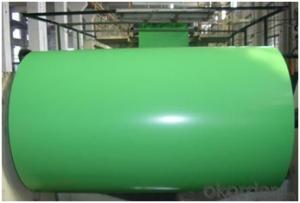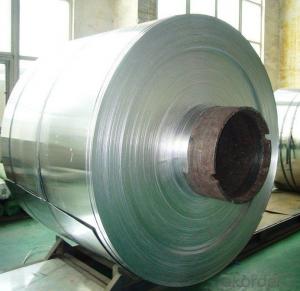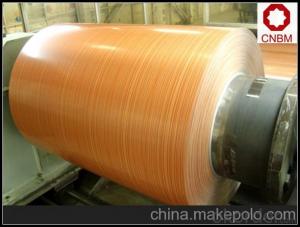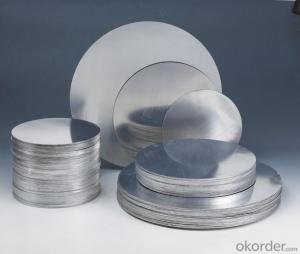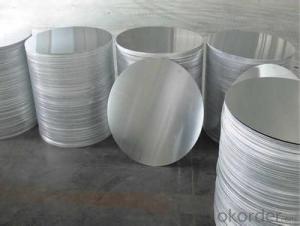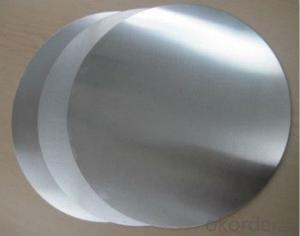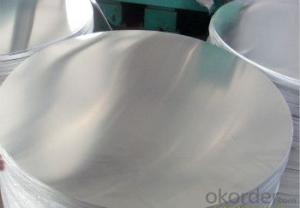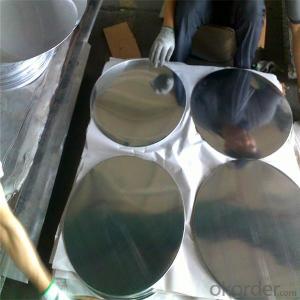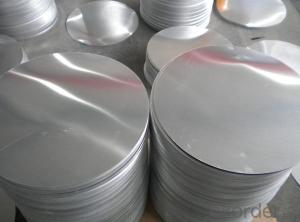G8 Aluminum Coil - CC Aluminium Circle in Thin Thickness for Pot Lid
- Loading Port:
- Shanghai
- Payment Terms:
- TT OR LC
- Min Order Qty:
- 5 m.t.
- Supply Capability:
- 1000 m.t./month
OKorder Service Pledge
OKorder Financial Service
You Might Also Like
Specification
1. Structure of CC Aluminium Circle in Thin Thickness for Pot Lid Description
CC Aluminium Circle in Thin Thickness for Pot Lid is one semi-finished aluminium material. This coil can be rolled down to aluminium coil,sheet,circle ect. The alloy AA1050 is widly used in building, industry ect. Its weight is much lower than steel. So many customers choosed aluminium material instead of steel.
2. Specification of CC Aluminium Circle in Thin Thickness for Pot Lid
CC Aluminium Circle in Thin Thickness for Pot Lid | |
Main Specification | |
Alloy | AA1xxx (AA1050, AA1060, AA1070, AA1100 etc.) |
AA3xxx (AA3003, AA3004, AA3005, AA3105 etc.) | |
AA5xxx, AA6XXX (AA5052,AA5083, AA5754, AA6061, AA6062 etc.) | |
AA8xxx(AA8011, AA8006 etc.) | |
Temper | H14,H16, H18, H22, H24, H26, H32,O/F, T4, T6, T651 |
Thickmess | 0.01mm-100mm |
Width | 30mm-1700mm |
Standard | GB/T 3880-2006/ASTM |
Special specification is available on customer's requirement | |
3. Application of CC Aluminium Circle in Thin Thickness for Pot Lid
(1).Interior: wall cladding, ceilings, bathrooms, kitchens and balconies, shutters, doors...
(2).Exterior: wall cladding, facades, roofing, canopies, tunnels,column covers , renovations...
(3).Advertisement: display platforms, signboards, fascia, shop fronts...
4. Feature of CC Aluminium Circle in Thin Thickness for Pot Lid
Surfact Quality :
Be free from Oil Stain, Dent, Inclusion, Scratches, Stain, Oxide Dicoloration, Breaks, Corrosion, Roll Marks, Dirt Streaks and other defect which will interfere with use,
Mechenical Property:
Chemical Composite and Mechanical Property
5. Certificate of CC Aluminium Circle in Thin Thickness for Pot Lid
SGS and ROHS(if client request, paid by client), MTC(plant provided), Certificate of Origin(FORM A, FORM E, CO), Bureau Veritas and SGS (if client request, paid by client), CIQS certificate
6. Image of CC Aluminium Circle in Thin Thickness for Pot Lid
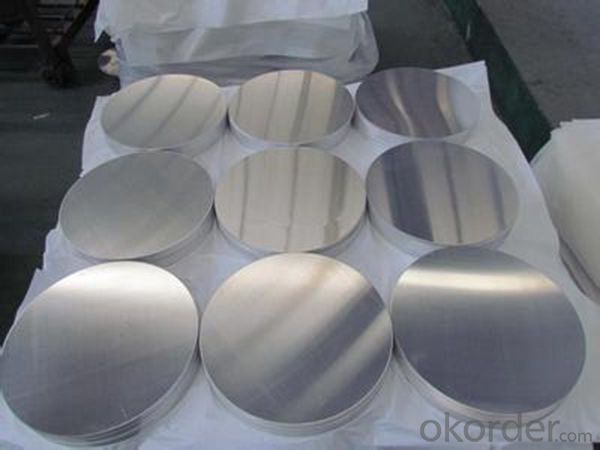
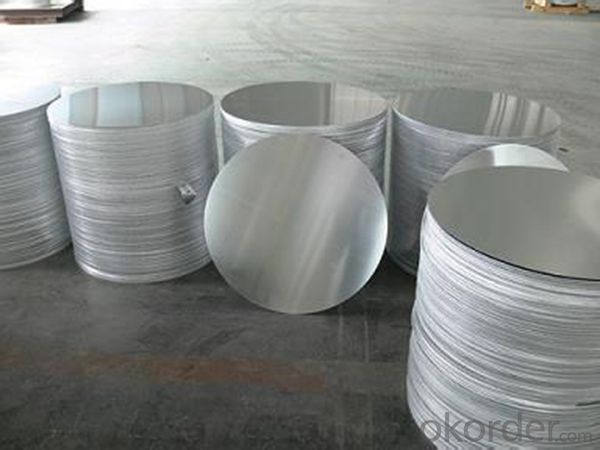
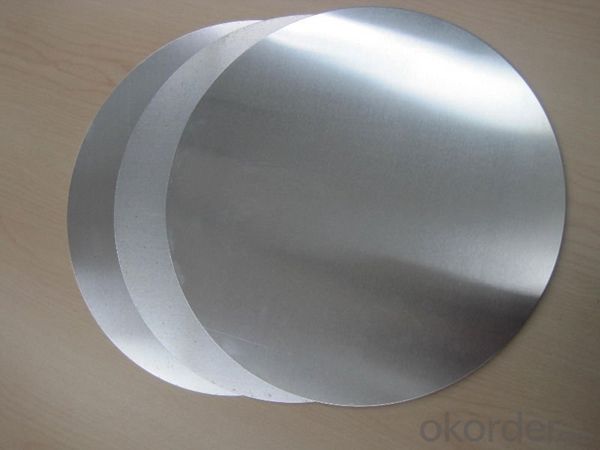
7. Package and shipping of CC Aluminium Circle in Thin Thickness for Pot Lid
First, plastic cloth with drying agent inside; Second, Pearl Wool ; Third, wooden cases with dry agent , fumigation wooden pallets, aluminum surface could cover blue PVC film
8. FAQ
1) What is the delivery time?
Depends on actual order, around 20 to 35 days
2) What is the QC system:
We have QC staff of 20 persons and advanced equipment, each production is with MTC traced from Aluminum ingot lot.
3) What market do you mainly sell to?
Australia, America, Asia, Middle East, Western Europe, Africa etc
- Q: I'm doing a science project on Aluminum and need to know what the other metals are in the following ores:BauxiteCryoliteGibbsiteI have to know what percentage of it is which metal. Don't know if that makes much sense, but I really need help because I can't find the answer anywhere. Thanks :D
- The bauxite is a sedimentary rock of chemical origin composed for the most part by alumina (Al2O3) and, in smaller measure, iron oxide and silica. It is the main aluminum source used by the industry. It is a residual taken place by the meteorización of the igneous rocks under conditions geomorfológicas and climatic favorable. Molecular formula: Na3AlF6 Synonym: Fluoroaluminato of sodium. Chemisorption of catechol on gibbsite, boehmite, and noncrystalline alumina... Alumina; Aluminium Oxyhydroxyde
- Q: Are aluminum coils prone to corrosion?
- Yes, aluminum coils are prone to corrosion. Aluminum is a reactive metal that easily forms a protective oxide layer when exposed to oxygen. However, this oxide layer can be compromised by certain environmental factors, such as exposure to moisture, salt, or other corrosive substances. Over time, this can lead to the formation of corrosion on the surface of aluminum coils. Regular maintenance and proper care, such as cleaning and applying protective coatings, can help mitigate the risk of corrosion.
- Q: Are parakeets allergic to aluminum because I wanted to use a metal pie pan for a bird bath.
- Aluminum is poisonous for birds (and not good for us either) Better to use a glass bowl or pie plate for the bird's bath.
- Q: What are the disadvantages of using aluminum coils?
- There are several disadvantages of using aluminum coils in various applications. Firstly, aluminum coils tend to have a lower heat transfer coefficient compared to other materials like copper. This means that they may not be as efficient in transferring heat, which can negatively impact the performance and energy efficiency of cooling or heating systems. Additionally, aluminum coils are more prone to corrosion compared to copper coils. This is especially true in environments with high humidity or exposure to harsh chemicals. Corrosion can lead to leaks in the coil, reducing its lifespan and potentially causing damage to the system. Another disadvantage of aluminum coils is their relatively lower tensile strength compared to other materials. This means that they may be more susceptible to damage or failure under excessive pressure or stress. This can be a concern in applications where the coils are subject to high pressure or frequent movement. Furthermore, aluminum coils can be more expensive compared to other materials like copper. While aluminum itself is a cheaper material, the manufacturing processes involved in producing aluminum coils and the additional coatings required to improve its performance can increase the overall cost. Lastly, aluminum coils may require more maintenance and cleaning compared to other materials. Due to their tendency to accumulate dust, dirt, and debris more easily, regular cleaning is necessary to maintain their performance and prevent clogging or blockages. Overall, while aluminum coils have their advantages such as being lightweight and resistant to corrosion in certain environments, it is important to consider these disadvantages when choosing the appropriate coil material for specific applications.
- Q: Is it safe or advisable to use aluminum coil for wrapping food?
- <p>Using aluminum coil to wrap food is not recommended. Aluminum can react with acidic or alkaline foods, potentially leaching harmful aluminum particles into the food. It's also not designed for food contact and may not be safe at high temperatures. Instead, use food-grade aluminum foil, which is specifically designed for cooking and wrapping food, ensuring it doesn't come into contact with non-food surfaces that could contaminate it.</p>
- Q: What are the uses of aluminum coils?
- Aluminum coils have various uses across multiple industries. They are commonly used in HVAC systems for cooling and heating purposes, as well as in refrigeration units. Additionally, aluminum coils are utilized in the construction industry for roofing, siding, and insulation purposes. They are also found in the automotive industry for radiators and condensers. Furthermore, aluminum coils are used in the manufacturing of electrical equipment, such as transformers and capacitors.
- Q: How do aluminum coils compare to stainless steel coils in terms of durability?
- Aluminum coils are generally less durable than stainless steel coils. While aluminum coils are lightweight and corrosion-resistant, they are prone to denting and are not as strong as stainless steel. On the other hand, stainless steel coils are highly durable, resistant to dents, and have a longer lifespan.
- Q: What are cold rolled aluminum coils and hot rolled aluminium coils, what are their respective features?
- The difference between hot rolling and cold rolling is that cold rolling is rolled at recrystallization temperature and hot rolling is above the recrystallization temperature.
- Q: An aluminum bar 3.80 m long has a rectangular cross section 1.00 cm by 5.00 cm, what is the resistance and what is the length of a copper wire 1.50 mm in diameter having the same resistance?
- first ,we will find out the cross sectional area Area= width* height =5.3*2.1=11.13cm^2 Area=11.13 *10^-4 m^2 shear stress = force /area =3.3*10^5/11.13*10^-4=0.296*10^9 Shear stress=2.96*10^8 N/m^2 shear modulus of aluminum=2.6*10^10 pa Shear strain =stress/modulus =2.96*10^8 / 2.6*10^10 =1.14*10^-2 =0.0114 from figure, strain=x/length 0.0114=x/220 (length in mm) x=0.0114*220 x=2.508 mm Ans: Shear deformation is 2.508 mm. ===============================
- Q: I have completely disassembled my aluminum bass boat and it is being sandblasted.I am restoring the boat and will be giving it a new paint job.What do you recommend in the way of primer,paint or anything else I need to know.I just don,t want to mess it up by using the wrong thing.Best answer gets a fishing trip in the same boat we are talking about. If you can make it here I will put you on some fish.Catfish,bream,crappie,bass or even saltwater fish.
- Whatever okorder
Send your message to us
G8 Aluminum Coil - CC Aluminium Circle in Thin Thickness for Pot Lid
- Loading Port:
- Shanghai
- Payment Terms:
- TT OR LC
- Min Order Qty:
- 5 m.t.
- Supply Capability:
- 1000 m.t./month
OKorder Service Pledge
OKorder Financial Service
Similar products
Hot products
Hot Searches
Related keywords
